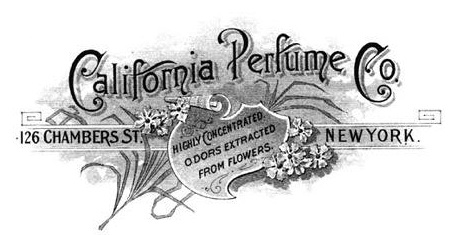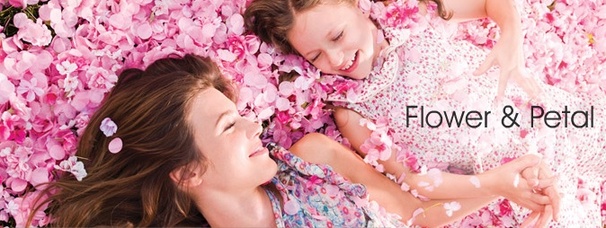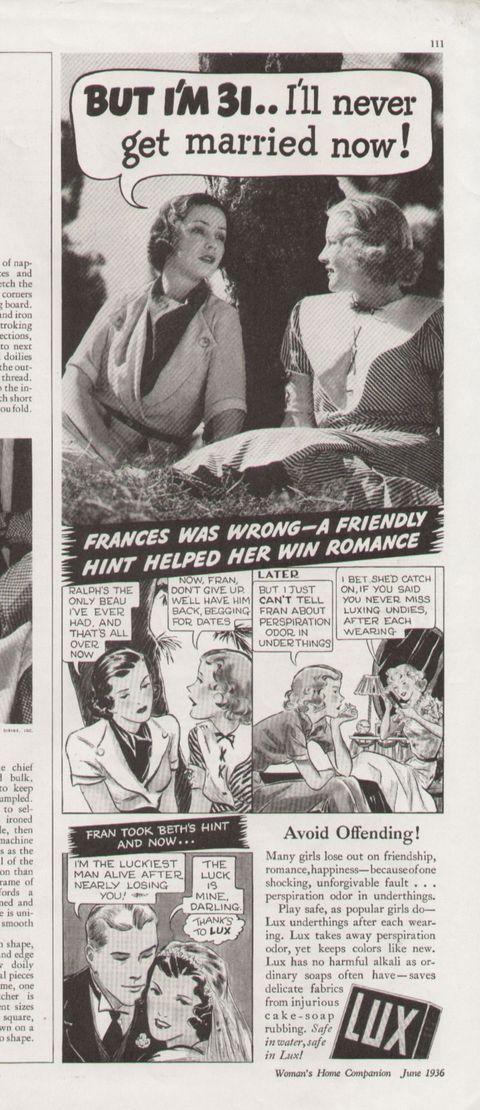Cynthia Rowley Flower & Petal Part 1: Slumming in Avonland & Encountering Odors, In A Good Way {Notebook: Fresh & Clean}

Some Thoughts on Class-Connoted Smells Around Avon Flower and Petal
At the time that David H. McConnell set up the California Perfume Company (1886-1939) the forerunner to Avon, perfectly desirable perfumes were designated with the term "odors", a word that has come to be negatively connoted in the contemporary period in the English language. If a "scent" generally smells good today, an "odor" in 2008 mostly does not.
This historical semantic shift recently took on a new meaning for us as we smelled the new Avon for Cynthia Rowley duo of perfumes for mothers and daughters called Flower and Petal, which will be issued this year for Mother's Day. The scents which at first smell pretty in a standard albeit retro way for Flower and in a more interesting, unexpected way for Petal turn out both to reveal some suprisingly frank notes in their base notes. We were so surprised that it felt suddenly like experiencing a time warp and going back to a noisy malodorous street in a Victorian era city (for Flower) and a turn-of the-century Belle Epoque garden (for Petal) where children are playing, running and stopping to catch their breaths covered with summery perspiration. The perfumes at some point smell unnaturally and shockingly natural in a realistic manner...
A hilarious 1936 advert for Lux soap showing the disastrous (yet redeemable) effects of BO on marriage prospects (TSS collection)
Avon is a company that was built from the bottom-up by David McConnell who would "canvass" whole neighborhoods going door to door to sell books first, then perfumes to sell his books better when he realized that there was greater profit and opportunity for development in that venture. He wrote in his autobiography The Great Oak (1903),
"The starting of the perfume business was the result of most careful and thorough investigation, guided by the experience of several years' successful operation in the book business; that is, in selling goods direct to the consumer or purchaser. I learned during this time that the proper and most advantageous way of selling goods was to be able to submit the goods themselves to the people. In investigating this matter nearly every line of business was gone over, and it seemed to me, then, as it has since been proved, that the perfume business in its different branches afforded the very best possible opportunity to build up a permanent and well established trade. Having once decided that the perfume business was the business, the question naturally presented itself, "By what name are these perfumes to be known; by what name is this company to be called?"
In the old-fashioned term "odor" ca. 19th and 20th century into the 1920s-30s, we like to think that there is a reference to a world where sensitivities were less fragile and where the range of allowed, licit smells that could go into a perfume was wider-ranging. Around the time that "odor" designated a bottled perfume, the streets smelled of ripened mud, horse manure, sweaty non-deodorized bodies, nidors, heavy charcoal smoke, dirty waters, what not...It is also in that era that more and more a hygienic dividing line comes into play to establish an invisible class line between the clean-smelling upwardly mobile middle class bourgeoisie and the great unwashed, i.e., the working classes. Two years after McConnell founded the California Perfume Company, Mum deodorant would be invented in 1888 in Philadelphia and is considered the first product created to prevent odor rather than just cover it. In Flower and Petal there is this refreshing exotic idea that a nice smell can just be the top layer of a much more robust and natural one.
Did we more generally at some point lose the insight that smells should not be narrowly hierarchised and some of them ostracized to a camp full of (bad) body odors? When did we start forgetting that so-called "bad" odors can smell "good" and that in fact extremes touch? When did our olfactory representations as illustrated in the English language turn Manichean, instead of accepting the full gamut? We will conveniently answer for now by saying that further research is required but that it seems to have started in the 1920s when "odor" could both mean a perfume in fragrance adverts and a malodor in deodorant ones, a divide that gained further currency in the 1930s when "odor" is practically demonized in ads such as a hilarious one by Lux Soap pointing to smelly feminine undies as the culprits for the lack of luck with men of a 31 year old spinster and further solidified in the 1940s.
In the 1913 edition of the Webster's dictionary "odor" is defined as "Any smell, whether fragrant or offensive". More recent editions prefer to put the stress on the act of a neutral perception, "a sensation resulting from adequate stimulation of the olfactory organ" and the 10th edition of the Merriam-Webster's dictionary now states that the particular meaning of "odor" as "something that emits a sweet or pleasing scent" i.e., "perfume" has become an archaism. If you look up the word in the Cambridge International Dictionary, it says that an Odour (UK) or odor (US) is "a smell, often one that is unpleasant, with this example, "Inside the room there was the unmistakable odour of sweaty feet".
The question we asked ourselves then was, is this a specific, class-connoted twist added to Avon perfumes? The surprise was all the greater as if there is one place in the world where you can expect to smell clean perfumes that would be in the mainstream US. But is Avon the mainstream? Or is it Happy by Clinique?
We wonder also then if Avon could be sly about some sociological factors too, like Yves Rocher and Isabel Desrroiné perfumes in France, (the two latter are part of the same company) which reveal a modest middle class connoted scent signature in many of their perfumes? Could the company have gathered enough experience and insight to know that certain smells are liked in the lower middle class to which it caters most notwithstanding its aspirational ads and subtly left them to float in their most affective perfumes? And finally does this mean that the idea of "clean" that seems so prevalent in America today is most typically that of the upwardly mobile middle class who wants to draw a line of separation with the lower middle working classes and distinguish itself by smelling ideally fresh and clean as a sign of social distinction?
This very idea reminds us of an anecdote told by perfumer Jean-Claude Ellena who comes from a working class background and who explained that one of the reasons he is so disgusted with the ubiquitous cheap smell of Galaxolide musk is that he associates it with the obsessive energetic cleansing sessions of his mother who wanted her son to be clean, i.e., socially respectable.
Avon is more than a brand, it is a whole culture that can feel a bit closed from the outside. Its class connotation is associated with the lower middle class and this from the origins of the company when McConnell reportedly felt moved by his constant encounters with "women who struggled to make ends meet" which gave him the idea of employing them part-time as direct sellers. It is in this social culture that homemakers would use such thrifty devices as soapsavers and we can imagine that sometimes there was not enough money to buy enough soap for the whole family.
The experience felt with Avon Flower and Petal for Cynthia Rowley can be best described and in more practical terms perhaps as the impression of entering a sub-culture with a strong identity in which archaic traits remain preserved.
Next, our reviews of Flower and Petal
You can read our post on The Reassuring Smell of the Middle Class









